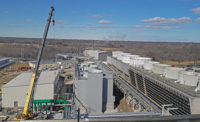Even if low diesel prices forestall a transition to natural-gas engines, fuel prices will climb and make alternatives economically viable again in less than a year, predicts Frank Manfredi, president of Cocoa, Fla.-based market research firm Manfredi & Associates.
"The price of oil is going to go back up into the range that makes all of these alternatives economic," said Manfredi. "I think this is just a short-term, six-month, maybe nine-month effect."
Residual Values
Manfredi is also wary of the effect the oil industry has on retail prices for new and used construction equipment. When oil production slows, equipment sales and purchases drop, which disrupts the market for machinery, he observes.
"Oil companies are shutting down exploratory well drilling, and some fracking activity has ceased, so the more expensive sources for oil are no longer economic," Manfredi says. "Equipment that's used in that sector—it's more likely they're not going to be bought or purchased."
This surplus also concerns Pirtle, who wants his machines to retain as much retail value as possible. "If the oil field contracts, you're going to see a lot of equipment and a lot of construction equipment on the market," Pirtle says. "A contraction can be devastating on that side of the market, at least on the equipment end, if it goes to extremes."
Andrew Agoos, principal of Orlando, Fla.-based Agoos Consulting and veteran of Hubbard Construction Co., Neff Rental LLC and Caterpillar Inc., says equipment managers will face the tumultuous oil sector the same way they always have: with common-sense solutions.
"It makes sense to control idling, which is just wasted fuel, and it makes sense to control unneeded trips," Agoos explains. "It makes sense to have 8-mile-per-gallon Class 8 trucks instead of 5½-mile-per-gallon Class 8 truck. I think we'll all do that, and we'll keep doing that, whether fuel is $2 per gallon or $4 per gallon."



Post a comment to this article
Report Abusive Comment